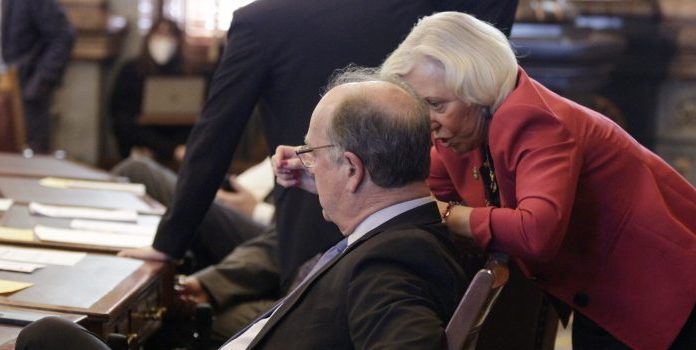(Headline USA) Kansas legislators signed off Wednesday on the state’s largest-ever taxpayer-funded incentives to attract thousands of new jobs even though most didn’t know the name of the company or what it plans to make.
The incentives would exceed $1 billion. The measure also cuts corporate income tax rates.
The Republican-controlled state Senate approved a bill, 31-9, that would create a new incentives program so the state Department of Commerce could offer a single company hundreds of millions of dollars in breaks once this year and once in 2023.
The GOP-controlled House approved the measure Tuesday, so it goes to Democratic Gov. Laura Kelly.
Kelly pushed for permission to offer tax credits, payroll subsidies and training funds in time to lure an unnamed company. Officials said the firm plans a $4 billion project and Kansas is competing against another state that some legislators said is Oklahoma.
“We want to buy these magic beans. We won’t tell you where it’s going to be, what it’s going to be, just that it’s going to be great,” said state Sen. Molly Baumgardner, a Kansas City-area Republican who voted no.
Officials who know the company’s identity said they were required to sign an agreement not to name it or disclose project details. They said the company expects to make a decision within a few weeks.
Backers of the measure argued that Kansas has lost out on other large projects because it can’t offer generous enough incentives.
“This is a tool that will help us be competitive with other states,” said Senate Commerce Committee Chair Renee Erickson, a Wichita Republican.
Ohio recently offered Intel Corp. incentives worth roughly $2 billion to secure a new $20 billion chipmaking factory. Michigan lawmakers in December approved $1 billion in incentives, two-thirds of it for General Motors for plants to assemble batteries for electric vehicles.
Electric vehicle maker Canoo has announced plans to open a factory in northeast Oklahoma next year that is expected to create 2,000 jobs.
But Wisconsin scaled back incentives for electronics giant Foxconn. It was supposed to invest $10 billion there and create 13,000 jobs but the deal now is for about 1,450 jobs with an investment of $672 million by 2026.
Kelly’s administration said the facility it’s pursuing would be the largest economic development project in Kansas history.
They’ve said the company will employ 4,000, and other firms supplying or supporting it would add several thousand more jobs. They said the company would pay an average of $50,000—when the per-person income in Kansas averages less than $32,000.
“I don’t think there’s a state in the country that wishes they were not in our position right now to create these kind of jobs with this kind of economic investment,” said Sen. Rob Olson, a Kansas City-area Republican.
Still, lawmakers in both parties scoffed at being pushed to commit without knowing more. Democratic state Rep. John Carmichael, of Wichita, mockingly suggested that Kansas was landing “a pornographic film production studio” and jobs for adult-film actors and camera crews.
“The problem is, you don’t know what kind of business you are betting your constituents’ tax dollars and futures on,” Carmichael told colleagues during the House’s debate.
The measure requires the state to cut its corporate tax rates by a half-percentage point for every big deal closed so that all businesses benefit. That would save companies roughly $100 million a year and drop the state’s top rate to 6% from 7% if two deals close.
Critics worried that the planned incentives are so rich that lawmakers won’t have room to consider other proposed tax cuts.
Spreadsheets from the House’s GOP leaders showed that Kelly’s proposed incentives could create a budget shortfall by mid-2026. The measure approved by lawmakers is a little less generous, spreads the incentives out over more years and requires legislative leaders to sign off on deals.
Some lawmakers were not impressed by the gloomy projections.
“I’ve never seen a profile that didn’t tank the budget in four or five years,” said state Sen. Jeff Longbine, an eastern Kansas Republican. “The Legislature is required to pass a balanced budget each year, and adjustments are made up and down.”
Adapted from reporting by the Associated Press

